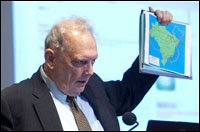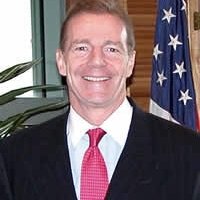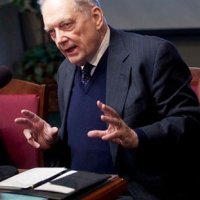Prospects for Brazilian-American Relations on the Eve of President Obama's Visit to Brazil
Opening Remarks: Ambassador Mauro Vieira, Embassy of Brazil in Washington; Speakers: Ambassador Craig Kelly, Vice President, The Cohen Group; Ambassador Luigi Einaudi, Distinguished Visiting Fellow, National Defense University; Luis Bitencourt, Dean of Academic Affairs, National Defense University; Carl Meacham, Senior Adviser to the Senate Foreign Relations Committee; Carolina Costa, Senior Associate, McLarty Associates; Moderator: Paulo Sotero, Director, Brazil Institute
Overview
The past two years of Brazil-U.S. relations have been marked by tension. First Brazil condemned Washington's willingness to accept the election results in the 2009 Honduran presidential race, and then Brazil recognized Palestine as a country, much to Washington's chagrin. Then finally Washington criticized Brazil's nuclear cooperation initiative with Iran in May 2010. In this context, President Obama's trip and Dilma Rousseff's election represent an opportunity for relations to be reset and strengthened, but whether or not this will come to fruition and in what form were the topics of this event. As noted by Paulo Sotero, director of the Brazil Institute, this trip will mark the first occasion "that a high level bilateral dialogue starts with the President of the United States visiting Brazil"—historically, Brazilian presidents or diplomats have always come to the United States. While this may purely be a coincidence in timing Sotero believes the trip is "indicative of some recognition by the United States that Brazil has become something different on the world scene." In fact, all speakers at today's event agreed that this was a unique diplomatic moment ripe with the potential for collaboration, most notably in the areas of trade, science and innovation, strategic affairs, and international relations.
Mauro Vieira, the current ambassador from Brazil to the United States, opened by citing his excitement at the potential of this visit. With a diplomatic career spanning over 30 years, he has been witness to a deepening and diversification in Brazil-U.S. bilateral relations, moving away from a primary focus on bilateral trade and towards issues more global in scope, such as global governance, the WTO, and climate change, among others. Vieira focused, however, on areas of domestic symmetry in which cooperation has occurred or where it could potentially occur. "Human rights," he said, "considered in a very wide aspect" are important to both countries, as well as the need to work towards gender and racial equality. According to Vieira, the two year old joint action plan to fight racial discrimination and to promote racial equality "continues to be a high priority in the bilateral agenda." Sotero added that although the United States debt situation is more severe than Brazil's, both countries need to improve the quality of public expenditure. Infrastructure and education are also critical issue areas in both countries, and both assert the need to make innovation a top priority.
 Moreover, although Vieira believes this is not the time to make a lot of conjectures, he "would expect some interesting announcements in the fields of innovation, science and technology." Ethanol and biofuels are areas of historic cooperation and it is "obvious" for that collaboration to continue or even increase.
Moreover, although Vieira believes this is not the time to make a lot of conjectures, he "would expect some interesting announcements in the fields of innovation, science and technology." Ethanol and biofuels are areas of historic cooperation and it is "obvious" for that collaboration to continue or even increase.
For his part, Ambassador Craig Kelly, Vice President of the Cohen Group, explained the diplomatic moment as the outcome of Brazil's ascent onto the world stage. In turn, he explained this ascent as the outcome of a growing economy and "centrist pragmatic policies." Brazil is the third largest generator of hydroelectric power and will soon be one of the largest oil producers. It is the third largest producer of aircraft and the fifth largest manufacturer of cars and trucks. 45 percent of its energy comes from renewable sources like ethanol, and in this area Kelly echoed the potential for cooperation between scientists and agronomists. He also asserted that as a country with so many natural resources, there was "almost no risk of Dutch Disease." Adding to this economic strength are pragmatic politicians, he said, who "solve real problems" rather than continue the contemporary Latin American tendency to dramatize politics. Combined, these two strengths give Brazil a global influence which Kelly believes is "unprecedented."
Nevertheless, Kelly also warned against the Brazilian bureaucracy and the red tape involved in doing business there. This issue was more thoroughly emphasized by Carolina Costa, senior associate at McLarty Associates. She noted that Brazilian exporters and investors agree that Brazil suffers from "inefficient and costly infrastructure and a sluggish bureaucracy"; "a complex and burdensome tax system"; and an archaic labor code." Moreover, both Brazil and the United States use "protectionist barriers that hinder firmer [economic] integration." On a more positive note, in spite of these obstacles Costa observed that the United States is the single largest investor in Brazil, and that an increasing number of Brazilian companies are operating in the United States. She expects "business relationships" will "continue to flourish," but added that Obama's trip will generate an excitement on which the private sector should capitalize, particularly in key investment sectors like energy and infrastructure. She posited that this visit was "likely to end with greater levels of investment" and closed by hoping that these external pressures and "greater closeness" will "have enough power to force Brazilian society to take a hard look" at the aforementioned barriers to stronger Brazilian and U.S.-Brazilian business performance.
 On another note, many speakers highlighted that a serious impediment to deeper bilateral cooperation was the prevailing image of Brazil in the United States. Ambassador Luigi Einaudi, a distinguished visiting fellow from the National Defense University, noted that this image, "conditioned by record inflation..., poverty..., a sense that the population is small and Indian and black, instability, and military rule" is often antiquated or even entirely incorrect. He warned against the prevailing American "diffidence" towards Brazil, which impedes us from seeing "the personalism with which Brazilian life and culture are suffused." According to Einaudi, this personalism could benefit the international community as Brazil continues its ascent as one of the world's major powers. Brazil has a long and often overlooked history of negotiation and peace-centered achievement, which Einaudi believes could be instrumental in the establishment of common rules of conduct in international bodies such as the Organization of American States.
On another note, many speakers highlighted that a serious impediment to deeper bilateral cooperation was the prevailing image of Brazil in the United States. Ambassador Luigi Einaudi, a distinguished visiting fellow from the National Defense University, noted that this image, "conditioned by record inflation..., poverty..., a sense that the population is small and Indian and black, instability, and military rule" is often antiquated or even entirely incorrect. He warned against the prevailing American "diffidence" towards Brazil, which impedes us from seeing "the personalism with which Brazilian life and culture are suffused." According to Einaudi, this personalism could benefit the international community as Brazil continues its ascent as one of the world's major powers. Brazil has a long and often overlooked history of negotiation and peace-centered achievement, which Einaudi believes could be instrumental in the establishment of common rules of conduct in international bodies such as the Organization of American States.
Carl Meacham, Senior Adviser to the Senate Foreign Relations Committee, then asked, "How does Congress see Brazil?" and answered rather dimly, "We don't." However, he added, "things are improving." Meacham noted that the "legislative context in which the world is operating has changed, but the attitude in Congress is the same." In this he echoed a point made earlier by Ambassador Kelly, who said that the United States should focus on the global nature of their relationship with Brazil. Unfortunately, the bureaucratic structure of the State Department makes it very difficult "to get colleagues in other regions like China or India to come together" to discuss global issues. Meacham also stressed that "Brazil needs to recognize that its own assent does not imply a change in global systems."
As far as another issue in need of recognition, Luis Bitencourt, Dean of Academic Affairs at the National Defense University, addressed the "800 pound gorilla [that] is not in the room": the bilateral security and defense issue. He first discussed the three phases of the Brazilian-American defense relationship, the first of which being the WWII Defense Agreement which led to 25 thousand Brazilian troops fighting for the allies in Italy. The second phase began during the Cold War, wherein the U.S. gave
the Brazilian military equipment and training in order to face counterinsurgents. Bitencourt argued that we are now entering a third phase of the relationship, where Brazil is "interested in learning more about cyber security, keeping the nuclear option open," and a potential space program. Bitencourt also echoed Einaudi in reading the opening statement of Brazil's National Strategy for Defense: "Brazil is a peaceful country by tradition and conviction." The U.S. would be wise to acknowledge this tradition in any international action. Thus, although he applauded Brazil-U.S. military cooperation on the UN peace efforts in Haiti, he added that unfortunately it was "not because of an agreement, but because the two commanders had been colleagues before." Bitencourt hoped for a new defense agreement in the future, but said that he was not sure government administrations realized or would act on the opportunity before them.
All the speakers reiterated their optimism about the prospects of President Obama's visit to Brazil, but almost all speakers were sure to reiterate the need to be realistic. This visit is a "positive gesture" and "consistent with American interests," Meacham noted, but "maybe we should have lower expectations." Diplomatic visits are often prone to hyperbolic assessments of potential outcomes. Although "it's possible to build elements of a relationship that can rise to become strategic," Sotero concluded, "it's important to be realistic of the difficulties that exist in both countries."
Drafted by Jillian Macnaughton
Paulo Sotero, Brazil Institute
Speakers

Paulo Sotero
Mauro Vieira

Craig Kelly
Senior Director, International Government Relations, ExxonMobil Corporation; Former U.S. Ambassador to Chile

Carolina Costa
Carl Meacham

Luigi Einaudi
Trustee, Saint Giacomo Charitable Foundation
Hosted By

Brazil Institute
The Brazil Institute—the only country-specific policy institution focused on Brazil in Washington—works to foster understanding of Brazil’s complex reality and to support more consequential relations between Brazilian and US institutions in all sectors. The Brazil Institute plays this role by producing independent research and programs that bridge the gap between scholarship and policy, and by serving as a crossroads for leading policymakers, scholars and private sector representatives who are committed to addressing Brazil’s challenges and opportunities. Read more

Latin America Program
The Wilson Center’s prestigious Latin America Program provides non-partisan expertise to a broad community of decision makers in the United States and Latin America on critical policy issues facing the Hemisphere. The Program provides insightful and actionable research for policymakers, private sector leaders, journalists, and public intellectuals in the United States and Latin America. To bridge the gap between scholarship and policy action, it fosters new inquiry, sponsors high-level public and private meetings among multiple stakeholders, and explores policy options to improve outcomes for citizens throughout the Americas. Drawing on the Wilson Center’s strength as the nation’s key non-partisan policy forum, the Program serves as a trusted source of analysis and a vital point of contact between the worlds of scholarship and action. Read more
Thank you for your interest in this event. Please send any feedback or questions to our Events staff.










